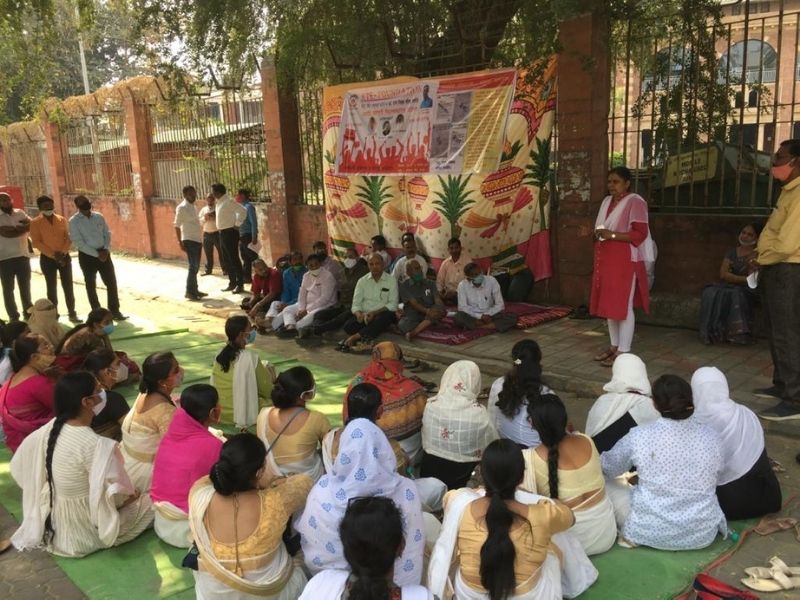-Dipta Joshi
Members of the Nagpur-based RTE Foundation, representing 3,000 English medium budget private schools that charge as little as Rs 20,000 tuition fees per annum, have threatened a fast-unto-death from April 1 unless the state government releases the Rs 800 crore it owes them since 2017-18 for providing free admissions to children under the Right to Education (RTE) quota. The Foundation’s earlier attempts at a fast-unto-death (March 8 at Mumbai’s Azad Maidan) had forced the state’s education minister, Varsha Gaikwad as well as the minister of state for education, Bachu Kadu into giving written assurances agreeing to pay 50 percent of all pending reimbursements within a week. However, despite its promises the government released Rs 50 crore only in the last week of March. Budget private schools — which are already on the brink of financial bankruptcy due to non-payment of annual fees by parents — say any further delay in RTE reimbursements will lead them to shut down permanently.
Under s.12 (1) (c) of the landmark Right of Children to Free & Compulsory Education (aka RTE) Act, 2009, elementary schools dispensing pre-primary education are obliged to reserve 25 percent of capacity in classes I-VIII for poor neighbourhood children aged between 6-14 years. The Act also requires (under s .12 (2)) that the State (state or local governments) compensate the private unaided (financially independent) schools’ costs for providing free of charge education by reimbursing them tuition fees equivalent to the per pupil cost incurred in their own government primary schools or actual fees of private schools, if lower. However, since 2011-12 when the act was first enforced in the state, payments from the state government have always been disbursed in parts leaving many schools with little or no payments for the year. For instance, in 2017-18, only 50 percent of reimbursements were disbursed and yet the government cleared 28 percent of the payments for the year 2018-19 without clearing the backlog.
Keeping with the provisions of the RTE Act, all reimbursements have to be borne by the Centre as well as state governments in 60:40 ratio. However successive governments in Maharashtra have always cited delays in receiving the central government’s share of the total contribution and thus denied the primary-secondaries their full dues. According to the RTE Foundation, while the state government has claimed (according to recent media reports) to have received Rs 484 crore from the centre until 2019-20 and disbursed Rs 487 core to eligible schools till date, documents accessed by the Foundation showed the central government as having contributed as much as Rs 4,401 crore until 2019-20. The RTE Foundation had accessed the above information under the Right to Information Act (2005) in September 2020.
“There is a difference of Rs 3914 crore according to what the state government says it received and what the RTI documents accessed by us show. Obviously, this means though the state government has not contributed its share to the reimbursement pool, it has spent the money given by the Centre for reimbursement on other things. The government needs to come clean about what happened to the Rs 3914 crore paid be the Centre till date. It also needs to realise that the part payments made each year raise the scope for corruption within the department,” says Sachin Kalbande, president, RTE Foundation.
The dispute in computing RTE reimbursements stems from the fact that the state government continues to believe that the actual per pupil expenditure for expenses on uniforms, writing materials, text books, tuition fees etc. by budget private primaries averages just Rs 17,670 per year and as such under s.12 (2) it is obliged to reimburse the lesser amount as against the Rs 28,008 per pupil per year expense ratified by the Centre. The RTE Foundation demands the state government either pay budget private schools the amount ratified by the Centre or Rs 40,000 per pupil per year – the amount it spends in its own zilla parishad run schools. It has also demanded the government issue an ordinance to ensure immediate payment of pending tuition fees by parents who have abstained from paying school fees in the absence of regular physical classes so far and also doing away with the recent reimbursement eligibility conditions issued by the education department. The list of conditions states only schools whose entire student population holds valid Aadhar cards are eligible for RTE reimbursements.
Citing the list of conditions as means to further harass school managements, the RTE Foundation has demanded the resignation of the education department officials as well as the state’s education minister. Till date the state government has ignored the demands for pending RTE reimbursement dues raised by associations like the Maharashtra English School Trustees Association (MESTA) and the Independent English Schools Association (IESA) which together represent 14,000 budget private schools. With a growing number of parents preferring private English-medium schools over government run Zilla Parishad schools, it is high time the government recognises the vital role played by these low-cost schools which dispense quality education to 40 percent of the state’s school-going children.
Also read: RTE Forum slams slashing of education budget 2021
Posted in News, States























